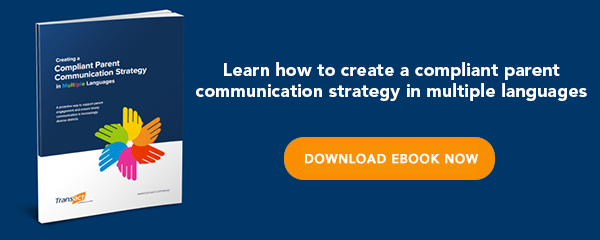Parents and families play an integral role in their children's education, and establishing meaningful two-way communication with them fosters student success. The Office for Civil Rights (OCR) establishes communication guidelines with parents who do not proficiently speak English. The right technology supports schools’ compliance with these rules, especially when parents have limited English proficiency (LEP).
Compliance with OCR guidelines is more than just a set of boxes to check. It offers significant value to schools and the students they serve in the following ways:
- Promoting a more diverse student body with a richer variety of experiences
- Reducing liability and negative public perceptions
- Offering more and better learning opportunities
- Supporting greater parent and family engagement
Quality translations by qualified, trained translators pull parents and families into academic life, encouraging them to support their learners and become more engaged. Volunteer and student translations are often inadequate and not compliant with OCR guidelines. While OCR does permit machine translations, they must be reviewed by a qualified, trained translator. Here’s how technological translation and other services help achieve OCR compliance and foster a richer school culture.
The Role of Parent Engagement
Parents and families play an indispensable role in student success. Regardless of socioeconomic background or the barriers a student faces to academic achievement, authentic parent and family engagement enhances grades and educational outcomes. Parent and family engagement can improve classroom behavior, reduce reliance on remedial resources, and lower the risk of dropping out.
OCR requires that parent communications be “accessible” to LEP parents and families. Without quality translations, parents cannot fully understand or engage with their children’s education. For first-generation immigrants, these translations serve a dual purpose: communicating clearly, and demonstrating that the parent is an important member of the school community.
Barriers to Parental Involvement
For parents and families with limited English proficiency, language can be a barrier to academic involvement. Without quality translations, parents may rely on their children to read the document, placing the child in an awkward and potentially difficult role. Relying on student translations can also lead to miscommunication between families, school staff, and administration. In some cases, a student might willfully mistranslate a notice. Consider how reluctant a student might feel to share that they have unexcused absences.
Schools sometimes rely on volunteer translators or teachers, a solution that isn’t typically OCR compliant. It may also waste school resources by taking educators away from other tasks. Google Translate and other online-only solutions are similarly inadequate. They often fail to correctly interpret the document, and without a qualified, trained translator checking them, the reliability of the documents cannot be verified. Literal translations often fail—for example, consider how “make-up day” might be translated as “cosmetics day.”
The COVID-19 crisis highlights the need for access to reliable translations that allow for rapid communication with all families. Around the globe, more learners than ever are completing classes in non-traditional settings—either at home or with hybrid models—an approach that demands greater parental involvement. Schools must be able to communicate directly and efficiently. When they fail to do so, children of parents with limited English proficiency are at a distinct disadvantage—one that the school can proactively navigate with proper resources in place. Without doing so, this threatens academic performance. In communities where students have returned to school, rapid and accurate communication about safety measures and evolving policies is critical to student welfare.
Translation Features That Can Help
With so many translation services marketing themselves to schools, it’s important for administrators to consider their goals and how to achieve them. Translations must be legally compliant, meeting all communication requirements under the Every Student Succeeds Act (ESSA).
Hallmarks of quality translations and translation services include:
- ESSA compliance: ESSA-required notifications must include all information mandated in the law, which often requires that experts review notifications for legal compliance.
- Translations and oral interpretation: ESSA and civil rights laws require that parental communications be provided, to the extent practicable, in a language that parents can understand. When the school cannot practicably provide written translations, it is always considered practicable to provide oral interpretation.
- Forms or letters: Make communication easier with form and letters created by experts and translated by qualified, trained translators.
- Confidentiality: The Family Educational Rights and Privacy Act (FERPA) requires schools to keep academic records confidential. Other laws—IDEA, Section 504 of the Rehabilitation Act, and more—may also come into play, particularly when a student has a disability. Translation services must offer full confidentiality.
- Unlimited use: Some form services only allow a certain number of uses, even with their most expensive license. TransACT ParentNotices offers unlimited district-wide access.
- Usage guidelines: A quality service is only as good as its implementation. TransACT’s RoadMaps for ESSA offers legally informed guidelines to help educators identify when to send parent notifications.
- Mobile access: By 2025, an estimated three-quarters of Internet users will access the web only with their smartphones. Mobile access allows parents to view notices quickly, and in some cases, it may provide the only way for parents to see messages.
TransACT provides a full suite of services that go beyond compliance, focusing on accessibility, student equity, and family support.
Translation services are about much more than understanding language. Quality translations break down educational and institutional barriers, ensuring every student has access to a quality education, and every parent and family have the opportunity to participate.
Discover the four main benefits of compliance software for school districts or contact us to request a quote today!





